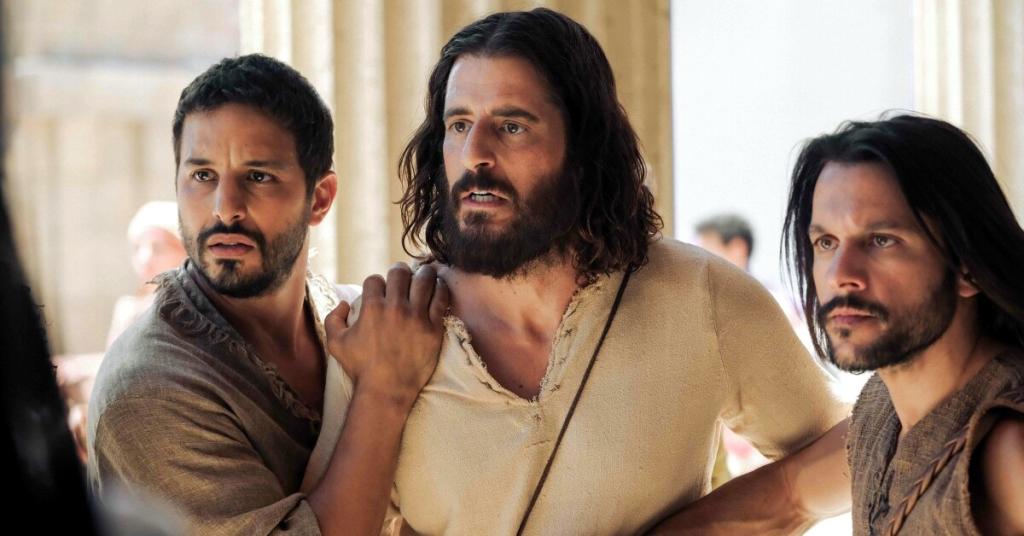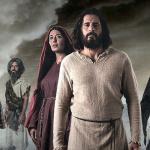In the last post, I discussed the omission of the Transfiguration from The Chosen. This time, we’re looking at the Bread of Life Discourse, only part of which made it into the Gospels-inspired show.
The Chosen, the Bible and the JCU
In part one, I asked if eliminating the Transfiguration entirely from season 4 meant that the universe of the show, which (being a Marvel fan) I nicknamed the JCU (Jesus Cinematic Universe), has branched off from the Gospels timeline.
I wondered if the reality in the JCU was now substantially different from the reality of the actual Gospels.
The Bible remains the Bible, and series creator Dallas Jenkins has regularly emphasized that the show is no substitute for reading actual Scripture. But, in watching the show (I do, and I enjoy it), it’s good to bear in mind that the JCU is a thing of its own.
For storytelling and production reasons, The Chosen is not — nor has it ever purported to be — a perfect rendition of the Gospels.
Also, Jenkins is an Evangelical. But he has advisors from different faiths, who appear in regular Bible Roundtables, dissecting the episodes. So, Jenkins has worked to steer a course through Jesus’ story that won’t alienate different varieties of Christians (along with non-Christians).
By its nature, this approach has perils of its own. Jenkins has said this is a show about Jesus and His followers, not theology. OK, I understand that, but sooner or later, theological differences are bound to creep in.
So far, Jenkins and his fellow writers have steered deftly around the major pitfalls in adapting the Gospels into a dramatic, human-centered narrative. But as we approach the climax of the tale, things could get a lot trickier.
What Is the Bread of Life Discourse?
If you’re a Catholic, for several weeks, the Gospel readings at Sunday Mass have been from John 6, which contains the Bread of Life Discourse and the section after it, called the Words of Eternal Life Discourse.
So you know what I’m talking about, here it is, in its entirety (John 6:22-69). In it, you’ll notice that Jesus uses “Amen amen,” indicating great emphasis on what He is about to say:
The next day, the crowd that remained across the sea saw that there had been only one boat there, and that Jesus had not gone along with his disciples in the boat, but only his disciples had left. Other boats came from Tiberias near the place where they had eaten the bread when the Lord gave thanks.
When the crowd saw that neither Jesus nor his disciples were there, they themselves got into boats and came to Capernaum looking for Jesus.
And when they found him across the sea they said to him, “Rabbi, when did you get here?”
Jesus answered them and said, “Amen, amen, I say to you, you are looking for me not because you saw signs but because you ate the loaves and were filled. Do not work for food that perishes but for the food that endures for eternal life, which the Son of Man will give you. For on him the Father, God, has set his seal.”
So they said to him, “What can we do to accomplish the works of God?”
Jesus answered and said to them, “This is the work of God, that you believe in the one he sent.”
So they said to him, “What sign can you do, that we may see and believe in you? What can you do? Our ancestors ate manna in the desert, as it is written: ‘He gave them bread from heaven to eat.’”
So Jesus said to them, “Amen, amen, I say to you, it was not Moses who gave the bread from heaven; my Father gives you the true bread from heaven. For the bread of God is that which comes down from heaven and gives life to the world.”
So they said to him, “Sir, give us this bread always.”
Jesus said to them, “I am the bread of life; whoever comes to me will never hunger, and whoever believes in me will never thirst. But I told you that although you have seen [me], you do not believe. Everything that the Father gives me will come to me, and I will not reject anyone who comes to me, because I came down from heaven not to do my own will but the will of the one who sent me. And this is the will of the one who sent me, that I should not lose anything of what he gave me, but that I should raise it [on] the last day. For this is the will of my Father, that everyone who sees the Son and believes in him may have eternal life, and I shall raise him [on] the last day.”
The Jews murmured about him because he said, “I am the bread that came down from heaven,” and they said, “Is this not Jesus, the son of Joseph? Do we not know his father and mother? Then how can he say, ‘I have come down from heaven’?”
Jesus answered and said to them, “Stop murmuring among yourselves. No one can come to me unless the Father who sent me draw him, and I will raise him on the last day. It is written in the prophets: ‘They shall all be taught by God.’ Everyone who listens to my Father and learns from him comes to me. Not that anyone has seen the Father except the one who is from God; he has seen the Father.
“Amen, amen, I say to you, whoever believes has eternal life. I am the bread of life. Your ancestors ate the manna in the desert, but they died; this is the bread that comes down from heaven so that one may eat it and not die. I am the living bread that came down from heaven; whoever eats this bread will live forever; and the bread that I will give is my flesh for the life of the world.”
The Jews quarreled among themselves, saying, “How can this man give us [his] flesh to eat?”
Jesus said to them, “Amen, amen, I say to you, unless you eat the flesh of the Son of Man and drink his blood, you do not have life within you. Whoever eats my flesh and drinks my blood has eternal life, and I will raise him on the last day. For my flesh is true food, and my blood is true drink.
“Whoever eats my flesh and drinks my blood remains in me and I in him. Just as the living Father sent me and I have life because of the Father, so also the one who feeds on me will have life because of me. This is the bread that came down from heaven. Unlike your ancestors who ate and still died, whoever eats this bread will live forever.”
* These things he said while teaching in the synagogue in Capernaum. Then many of his disciples who were listening said, “This saying is hard; who can accept it?”
Since Jesus knew that his disciples were murmuring about this, he said to them, “Does this shock you? What if you were to see the Son of Man ascending to where he was before? It is the spirit that gives life, while the flesh is of no avail. The words I have spoken to you are spirit and life. But there are some of you who do not believe.”
Jesus knew from the beginning the ones who would not believe and the one who would betray him. And he said, “For this reason I have told you that no one can come to me unless it is granted him by my Father.”
As a result of this, many [of] his disciples returned to their former way of life and no longer accompanied him. Jesus then said to the Twelve, “Do you also want to leave?”
* Simon Peter answered him, “Master, to whom shall we go? You have the words of eternal life. We have come to believe and are convinced that you are the Holy One of God.”
You’ll notice I put asterisks next to two sections and italicized a part of each. These are the only lines from this selection from John 6 that appear in the season finale of The Chosen.
But, they are appended to different things. The first line is given to the Pharisee Shmuel, in response to a speech from Jesus after Mary, the sister of Lazarus, anoints Jesus’ feet with oil and dries them with her hair.
Peter still says the second line, but it is in response to Jesus asking whether the disciples will follow Him into Jerusalem, at the beginning of Holy Week (which season 5 will cover).
What Does This Mean for Catholics?
Coupled with Jesus’ offering of bread and wine at the Last Supper, these verses contain the heart of the doctrine of the Eucharist, the source and summit of the Faith. It’s the underpinning of what we call transubstantiation.
As I said in the last post, I am no theologian, so bear with my explanation of this.
Obviously, Catholics, and Orthodox, disagree with other Christians on whether the bread and wine truly become the Body, Blood, Soul and Divinity of Christ (transubstantiation), or if they just coexist with the essence of Christ (consubstantiation), or whether they are merely symbolic.
To us, the Bread of Life Discourse explains the idea behind transubstantiation, while the Last Supper is the practice — how we are to express this idea in reality. The actual, physical sacrifice of Christ happened on Calvary, and then, in a mystical way, it happens again, in an unbloody manner, during the Consecration at every Mass.
We then consume the now-consecrated and transubstantiated bread (and/or the wine, as each is sufficient unto itself), as Jesus demonstrated at the Last Supper.
In his Sunday Sermons, Bishop Robert Barron has been following the John 6 readings. In this video, he talks about the aftereffects of the Bread of Life Discourse on Jesus’ listeners:
What Does Changing the Context of These Lines Mean for the Last Supper?
In picking out a couple of lines of the Bread of Life and Words of Eternal Life Discourses and using them in a different context makes me wonder how the Last Supper will be portrayed.
Without the previous explanation from John 6, the burden falls on the Last Supper itself to explain the significance of the bread and wine. And, as I said, Christians have a strong disagreement on this.
I’ll be very curious to see how Jenkins and his team navigate these choppy waters, both in maintaining the integrity of the JCU narrative and not angering large parts of the audience. The idea of the Eucharist is unavoidably polarizing.
No doubt, when he started this endeavor, Jenkins knew he’d hit this point eventually. Season 5 may be his greatest ecumenical challenge yet.
What Jonathan Roumie Said About the Bread of Life
The actor who plays Jesus in The Chosen is a serious Catholic, so the Bread of Life Discourse means a lot to him. But, he didn’t get to make the speech in the show.
So, at the recent National Eucharistic Congress in Indianapolis, Roumie was a featured speaker. He wore a t-shirt that quoted Catholic writer Flannery O’Connor, recounting how she responded to someone suggesting the Eucharist was merely a symbol.
(BTW, you can now buy the shirt.)
Then, using his Jesus accent from The Chosen, Roumie took the opportunity to actually say the words he didn’t get to say on film. Here’s the whole thing:
So, Should Catholics Still Watch The Chosen?
I like it, but I turned to Claretian Missionary priest Father Darrin Merlino for his opinion:
I have no moral objection to watching it. There’s not a lot of caveats. You have to be willing to deal with a lot of creative license and some major Gospels events removed on purpose for whatever reason.
It’s written well. Just the parts that are missing, they’re missing. The parts they have in there is pretty well-written.
And frankly, Catholics could theoretically have done a show like this. But, they didn’t. And, having Jesus talked about in a major international hit TV show offers an opportunity for all of us to talk about Jesus.
And that’s never a bad thing.
You can watch season four of The Chosen on its own app, BYUtv, on several streaming services, and, starting Sept. 1, on The CW Network.
Image: (L-R): Jonathan Roumie as Jesus and Shahar Isaac as Simon Peter — Photo: The Chosen — © 2024 The Chosen. All Rights Reserved.
Don’t miss a thing: Subscribe to all that I write at Authory.com/KateOHare.














